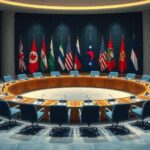The Saudi Role in the Russo-Ukrainian Conflict: Interests Over Altruism
The article analyzes Saudi Arabia’s role in facilitating peace talks between Russia and Ukraine, noting that the Kingdom’s involvement is driven by self-serving interests rather than genuine commitment to conflict resolution. Crown Prince Mohammed Bin Salman aims to enhance his international stature and secure economic benefits through mediation, amidst concerns over Saudi Arabia’s human rights record and its alignment with Russia’s authoritarian governance.
U.S. President Donald Trump’s promise to resolve the Russo-Ukrainian conflict swiftly has not materialized, with Saudi Arabia chosen as a venue for talks, prioritizing diplomatic appearances over effective resolutions. The selection stems from limited negotiation options, as prominent Russian officials remain barred from Europe and neutral countries lack the willingness to mediate. Saudi Arabia’s substantial $600 billion investment in the U.S. economy during Trump’s presidency likely influenced its hosting role.
Saudi Arabia’s involvement does not necessarily advance peace, as Crown Prince Mohammed Bin Salman aims to bolster his international reputation. A recent agreement between Russia and Ukraine, initiated in Riyadh, may serve to enhance MBS’s status despite ongoing issues surrounding his leadership style and previous governance failures. Despite significant lobbying efforts to improve its image, Riyadh struggles in its goals under MBS’ Vision 2030, which emphasizes diversification from oil dependency.
Furthermore, the Saudi government’s track record on human rights calls into question its ability to mediate effectively, particularly regarding Ukraine’s plight against Russian aggression. The similarity between MBS’s governance and Putin’s authoritarian style raises concerns about Saudi Arabia’s impartiality, as the two nations share a philosophy rooted in the principle of power dynamics.
While Saudi Arabia collaborates with Russia in OPEC+ to regulate oil prices, a peace deal in Ukraine could undermine the Kingdom’s financial interests by lowering oil prices, a consideration complicated by their large budget deficits and ambitious development projects. The perception of MBS prioritizing the Ukraine conflict over regional issues like Gaza may cause unrest within his own society.
Despite the perception of benefitting from the Ukraine crisis, Saudi Arabia’s profile has risen, attempting to distance itself from its historical alliance with the U.S. The Kingdom now positions itself favorably within global dynamics, emphasizing its strategy of “positive neutrality.” Moreover, the war has opened avenues for Saudi Arabia to attract resource-rich Russian investments and tourism, moving toward transforming Riyadh and Jeddah into prominent economic centers.
In conclusion, while Saudi Arabia has positioned itself as a peace facilitator between Russia and Ukraine, its motivations are largely self-serving, rooted in enhancing its global standing and economic viability rather than a genuine desire to resolve the conflict. The Kingdom’s involvement may not bring about a swift end to hostilities, aligning more with its strategic interests than with humanitarian goals.
In summary, Saudi Arabia’s involvement in the Russo-Ukrainian peace process appears to be more focused on self-interest and reputation enhancement than on genuine conflict resolution. Crown Prince Mohammed Bin Salman’s attempt to position the Kingdom as a mediator serves to bolster its international standing while masking severe human rights concerns and domestic issues. As the conflict progresses, Saudi Arabia’s motivations could continue to draw skepticism regarding their true commitment to peace.
Original Source: www.themoscowtimes.com








Post Comment